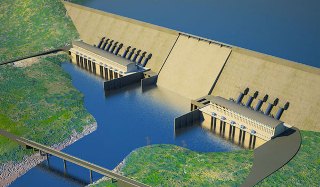Sudan warns against “worst-case scenario” of differences on Ethiopian dam
November 27, 2015 (KHARTOUM) – Sudan’s minister of water resources and electricity Muataz Musa has warned against the worst-case scenario among riparian countries of the Nile Basin due to unilateral actions on water issues.

He warned against the worst-case scenario if each country sought to unilaterally benefit from the Nile waters, saying conflicts and clashes among the riparian countries of the Nile Basin would be inevitable under this scenario.
Musa noted that the workshop brings in experts, media and civil society sectors in order to raise awareness about water issues and to underline the need for managing Nile Basin in a mutually supportive manner.
He expected that the meeting of the Sudanese, Egyptian and Ethiopian ministers of water and foreign affairs on the Grand Ethiopian Renaissance Dam (GERD) would convene in Khartoum next week.
It is noteworthy that the meeting of the water ministers of the three nations which was originally scheduled to be held in late November has been postponed at the request of Egypt in order to allow for the participation of the foreign ministers.
For his part, Egypt’s minister of irrigation and water resources Hossam Moghazi pointed to continued coordination among the foreign and water ministries of the three countries to set a date for the 10th meeting of the tripartite national technical committee on GERD.
He said the meeting, which is expected to take place in Khartoum, seeks to achieve agreement between the French and Dutch consultants to implement the technical studies which were requested by the tripartite committee in May 2013.
Earlier this month, Ethiopia’s minister of water and energy Motuma Mekasa said the French and Dutch consultants failed to come up with a common guideline to implement the technical studies for the GERD.
He provided three other options including to continue working with the French and Dutch consultants after overcoming their differences, to select one consultancy firm to undertake the required technical studies or to choose two other firms from those which were shorted-listed previously.
The upcoming meeting would discuss the various possible scenarios to deal with the consultants if they failed to agree on the implementation of the technical studies.
According to Egyptian media reports, well-placed sources expected that Egypt’s foreign ministry will take the lead in the coming rounds of talks in order to compensate for the failure of the technical track and not to waste time.
They expected that Egypt will likely make another official request to Ethiopia to stop the work on GERD until an agreement has been reached on its impact on Sudan and Egypt.
The same sources further expected that Cairo would lodge an official complaint to the African Union Peace and Security Council (AUPSC) and the UN Security Council (UNSC) to preserve Egypt’s national security.
The multi-billion dollar dam is being constructed on the Blue Nile, about 20 kilometers from the Sudanese border, and has a capacity of 74 billion cubic meters, and is expected to generate electrical power of up to 6,000 megawatts.
Egypt fears the dam will negatively affect its traditional share of water from the Nile, its only source of water which has been determined by a colonial-era water-sharing treaty.
But Ethiopia insists that this will not occur and asserts that the project is indispensable to its own national development and the economic welfare of its burgeoning population.
(ST)
